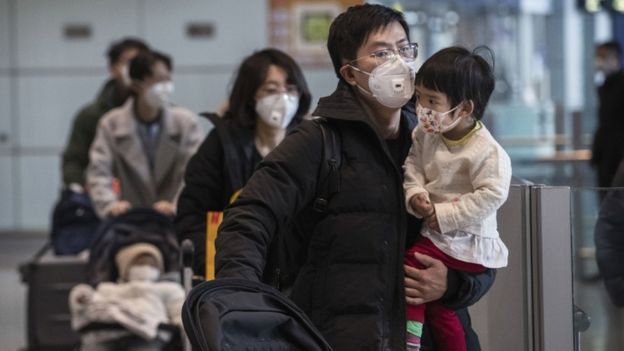
The new coronavirus has been declared a global emergency by the World Health Organization, as the outbreak continues to spread outside China.
“The main reason for this declaration is not what is happening in China but what is happening in other countries,” said WHO chief Tedros Adhanom Ghebreyesus.
The concern is that it could spread to countries with weaker health systems.
The death toll now stands at 170 people in China.
The WHO said there had been 98 cases in 18 countries outside of the country, but no deaths.
Most cases have emerged in people who have travelled from the Chinese city of Wuhan, where the outbreak began.
However, there have been eight cases of human-to-human infection – in Germany, Japan, Vietnam and the United States.
 Image copyrightGETTY IMAGES
Image copyrightGETTY IMAGESDr Tedros, speaking at the press conference in Geneva, described the virus as an “unprecedented outbreak” that has been met with an “unprecedented response”.
He praised the “extraordinary measures” Chinese authorities had taken to prevent it from spreading.
“Let me be clear, this declaration is not a vote of no confidence in China,” he added.
BBC Health correspondent James Gallagher said the WHO will now be able to support lower and middle income countries, helping them strengthen their disease surveillance and prepare them for possible cases.
How unusual is this declaration?
The WHO declares a Public Health Emergency of International Concern when there is “an extraordinary event which is determined … to constitute a public health risk to other states through the international spread of disease”.
It has previously declared five global public health emergencies:
- Swine flu, 2009 –The H1N1 virus spread across the world in 2009, killing more than 200,000 people, and a public health emergency was called to ensure the world was carefully monitoring its spread and able to respond, including with vaccines.
- Polio, 2014 – Although closer than ever to eradication in 2012, polio numbers rose in 2013. An emergency was declared due to fears the global fight against its eradication could face a major setback.
- Zika, 2016 – The WHO declared Zika a public health emergency in 2016 after the disease spread rapidly through the Americas. Although for many Zika symptoms are mild, it can be dangerous for pregnant women and the emergency was called to spur urgent research.
- Ebola, 2014 and 2019 – The deadly disease has twice been declared a public health emergency. The first one lasted from August 2014 to March 2016 as almost 30,000 people were infected and more than 11,000 died in West Africa. The WHO cited “the virulence of the virus, the intensive community and health facility transmission patterns, and the weak health systems” in affected countries. A second emergency was declared last year as an outbreak spread in DR Congo.
Source: BBC

